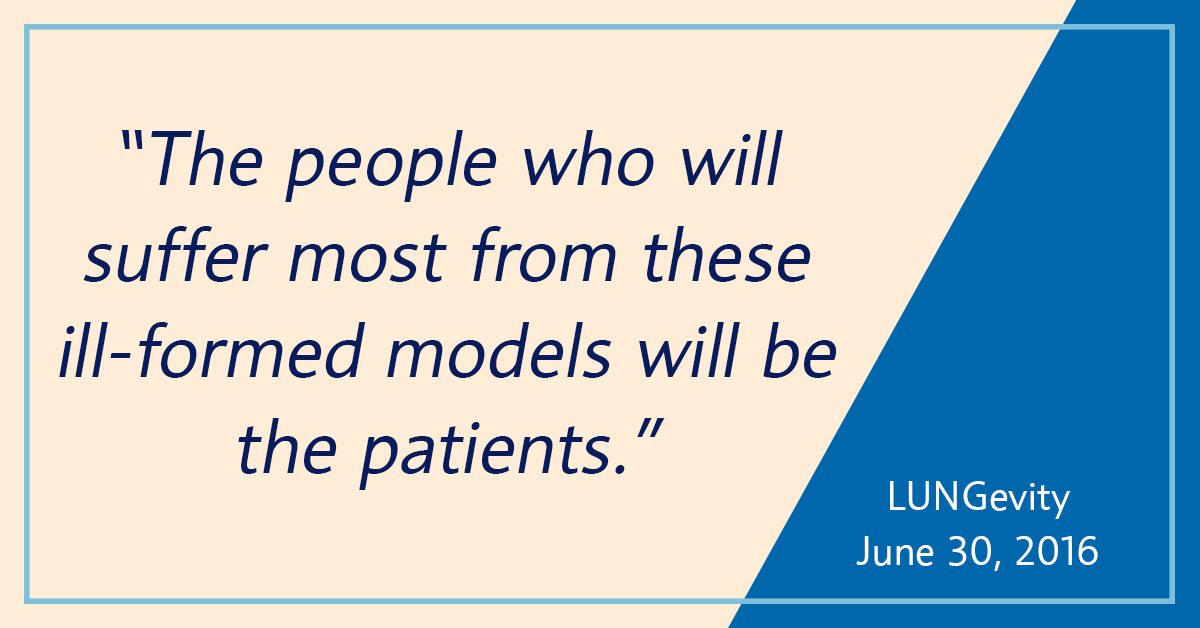
The Institute for Clinical and Economic Review (ICER) has set its sights on a new target: life-saving treatments for advanced non-small cell lung cancer (NSCLC).
ICER’s latest draft scoping document outlines what it will cover in its forthcoming report assessing treatments for advanced NSCLC. According to the scoping document, ICER’s evidence report will assess several categories of lung cancer treatments, including tyrosine kinase inhibitors (TKIs) and immunotherapies. The value of these treatments in the fight against NSCLC, which accounts for 85 to 90 percent of all lung cancer diagnoses, has been widely recognized. Since 2014, ICER has been issuing assessment reports that threaten patient access to life-saving treatments for debilitating and devastating conditions, such as congestive heart failure, multiple myeloma and diabetes, among others. ICER’s reports have historically relied on flawed methods and assumptions, lacked transparency and failed to reflect the complex realities of optimally caring for patients with these conditions.
When the NSCLC scoping document was initially released, ICER gave stakeholders just one week to comment. In response to feedback, ICER has agreed to extend the comment period by an additional week.

In spite of the very short comment period, many patient groups have already weighed in to say that ICER must proceed with caution as they conduct their analysis of treatments for an incredibly complex disease. Here is what they are saying:
ICER’s assessment of NSCLC does not acknowledge the complexity of lung cancer and the unique difficulty to develop personalized and effective treatments for patients.
- “… Given the complexity of lung cancer and its difficulty to treat we need to continue to support and advance more scientific breakthroughs and help make their way from the clinic to the treatment plans for those diagnosed with lung cancer. We encourage ICER to recognize the field of diagnostic testing is expanding exponentially and will lead to better personalized treatment planning so patients get the highest value drug for their cancer.” – Lung Cancer Alliance
ICER’s assessment of NSCLC does not meet its own outlined intent for transparency and full stakeholder inclusion in the review process.
- “Basing a model on incomplete inputs from ALL stakeholders could lead to misleading results and irresponsible decisions based on those results. The people who will suffer most from these ill-formed models will be the patients.” – LUNGevity
ICER’s assessment of NSCLC narrowly focuses on cost, losing sight of patient care and access to new, personalized therapies.
- “We cannot help but conclude that ICER is specifically excerpting some research to focus on that which provides the outcomes you are seeking to plug into your fiscal formula. The budget impact assessment appears to be the main focus for ICER, leaving us to wonder how useful this document could possibly be for determining what is best for the patient.” – Patients Rising
ICER’s assessment of NSCLC does not provide public stakeholders with sufficient time to provide thoughtful and thorough feedback.
- “Given the significant attention ICER’s assessments receive and the recent proposal by CMS to rely on ICER’s value standards in the Part B payment demonstration, we believe ICER has a responsibility to allow additional time for stakeholders to provide thorough, thoughtful feedback on the scoping document, as well as the draft evidence report. Therefore, we suggest that you give the public 30 or 60 days with no limit on response length to reply to both the scoping document and the draft evidence report. This timeline is consistent with those provided by federal agencies like FDA and CMS.” – Personalized Medicine Coalition
Learn more about how ICER’s methodology fails to meet patients’ needs here.







